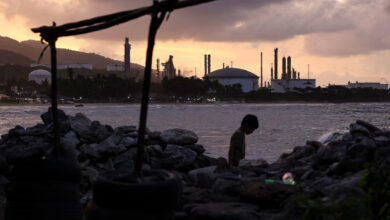The feeling of helplessness bordering on panic that strikes when we suddenly lose power in our homes is familiar to many of us. Overwhelmed by the sudden state of darkness we are so cruelly thrown into, we bravely fumble around for candles and try to make the best of an inconvenient situation–waiting impatiently for the oft taken for granted 19th century discovery to return to our homes.
But for one hour this Saturday, during this year’s ‘Earth Hour,’ millions across the globe will turn off their power in a deliberate ‘Earth-conscious’ decision.
An estimated one billion people across 92 countries including Egypt, will be participating in this year’s ‘Earth Hour’ movement hailed as the largest global earth awareness campaign in history, by preparing to turn off– or at least reduce– the use of non-essential lighting and electrical appliances on 27 March, from 8:30 PM to 9:30 PM, local time.
Last year, the Sydney-based initiative, first launched in 2007 by the World Wide Fund for Nature (WWF), brought together hundreds of millions of participants from 88 countries, with landmarks such as the Sydney Harbor Bridge, Golden Gate Bridge in San Francisco, Rome’s Colosseum and the Giza Pyramids and the Sphinx, all standing in darkness.
Organizers of Earth Hour 2010 say they are aiming to send a "powerful global message that citizens care enough about climate change to make changes," according to the event’s website.
Last year Egypt saw a large number of citizens and businesses participate in the campaign by reducing their homes’ lighting by 50 percent, according to a press release issued by the Egyptian Ministry of State for Environmental Affairs. In Cairo, lighting was decreased by 50 percent on the Airport Road, Nasr Road, Ismailia Egypt Road, Nile Corniche and Ramsis Street, as well as in several public buildings. Lighting at the Cairo Tower, Mohamed Ali Citadel, Temple of Luxor, and several major hotels was also reduced.
Officials are making final arrangements to once again turn off the lights at the Pyramids and Sphinx, Cairo Tower, Bibliotheca Alexandrina and the Mohammed Ali Citadel said Billy Gentle, communications coordinator for Earth Hour.
Several of the power downs at these formidable landmarks will be broadcast live via state-sponsored Channel One, a Ministry of Information official told Al-Masry Al-Youm.
Egypt’s Minister of State for Environmental Affairs Maged George, has called on other ministries to support efforts to make this year’s event a success and is urging citizens to participate in order to "acquire a positive environmental behavior that can be maintained in the future," said the ministry’s press release.
Egypt could certainly benefit from a reduction in energy consumption. Electricity consumption increases by a staggering seven percent each year, said Aktham Abul Ela, undersecretary and spokesperson for the Ministry of Electricity and Energy. During last year’s Earth Hour, Egypt saved only 50 megawatts of electricity, with most of the reductions taking place in Cairo and Alexandria.
"We hope that this year more governorates and towns will participate in this initiative, and that this amount will increase," said Abul Ela. Earth Hour, he added, is a useful tool to help the Ministry review national consumption rates and support their efforts towards a future where sustainable energy consumption is the norm.
According to Abul Ela, the ministry is involved in many programs aimed at raising awareness about energy consumption, with its primary efforts focusing on the distribution of energy-saving light bulbs.
"We have over 6 million energy-saving light bulbs being manufactured and distributed by 16 local companies across Egypt, with the ministry subsidizing half their cost," he explained.
The ministry is also trying to reduce the energy usage of ordinary street lamps nationwide with energy-saving bulbs, and is being helped by a three-year LE260 million grant from the government, added Abul Ela.
While the ministry is not directly involved in the planning of Earth Hour, electric company buildings will be powered down in support of the initiative, Abul Ela said. "We hope this campaign takes us in the direction of not only reducing lighting consumption, but also gets manufacturers involved in other environment-friendly domains."
Indeed, challenges in implementing environmentally friendly initiatives have much to do with a lack of awareness, where recent World Bank figures show that 23 percent of the population lives below the national poverty line.
A project launched by the Global Environment Facility (GEF) and implemented by the United Nations Development Programme (UNDP), seeks to evaluate and improve lighting efficiency in Egypt due to the inefficient lighting used in homes and community areas. The project’s report said, "Efficient bulbs and ballasts can save 75-80 percent in electricity, and therefore in electric bills, but the initial cost of the equipment poses a barrier for low-income households."
Compact fluorescent bulbs are indeed the optimal way to save on household energy. Although they cost three to five times as much as conventional bulbs, they consume just one quarter the electricity and last ten times longer, resulting in significant long-term savings. More importantly, it is one individual step towards helping preserve planet Earth.
So pick up an energy-saving bulb, prepare your candles and don’t forget to register your commitment at www.earthhour.org




